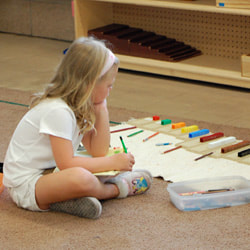Programs
Children's Learning World offers programs for children ages 6 weeks to 12 years of age.
The Montessori children are exposed to a full curriculum, which is presented individually or in small groups. The subjects include reading, writing, math, spelling, geometry, botany, zoology, geography, history, physical education, art, music, and drama. Children take part in two performances during the school year. Extracurricular activities are also available throughout the school day.
The Montessori children are exposed to a full curriculum, which is presented individually or in small groups. The subjects include reading, writing, math, spelling, geometry, botany, zoology, geography, history, physical education, art, music, and drama. Children take part in two performances during the school year. Extracurricular activities are also available throughout the school day.
